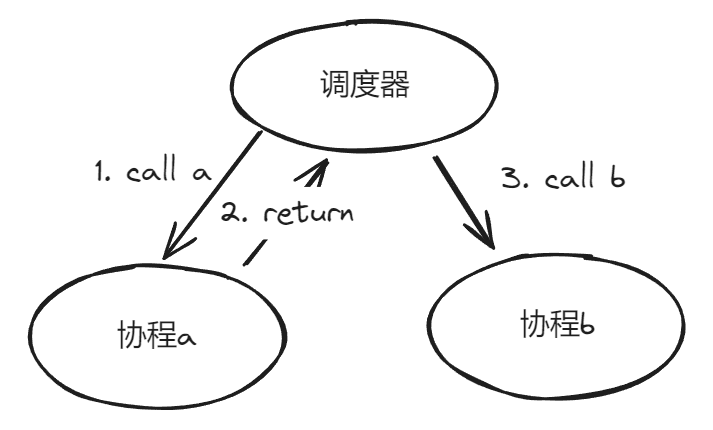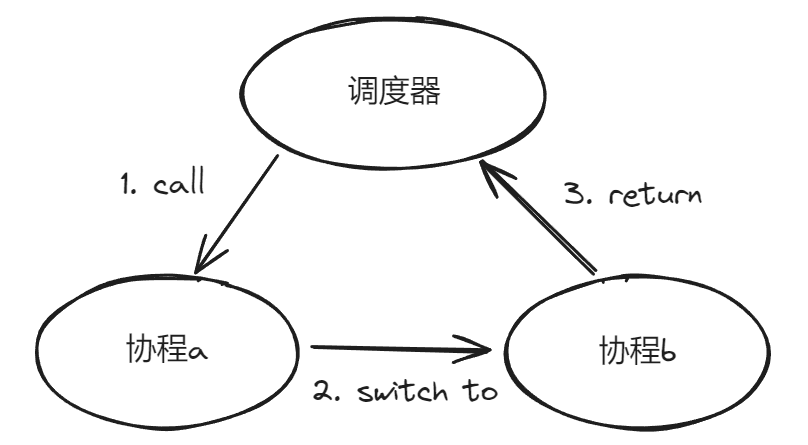协程是可以暂停执行,之后恢复的函数。
有栈协程 vs 无栈协程 有栈协程通过固定大小的栈空间作为协程运行时空间,切换协程就是这些固定大小空间直接的切换,协程内的程序逻辑全部运行在这段空间内。而无栈协程将
frame 保存在堆空间(C++20
是这样做的),依据协程的状态进行统一的调度执行。
有栈协程,每个协程会有固定大小的空间作为栈内存使用。
无栈协程,每个协程会有一个协程帧作为状态和变量的管理对象,然后进行类似状态机的函数调用过程。
无栈协程内存紧凑,但是不适合递归。有栈协程虽然适合递归,但是分配的固定空间,可能会浪费,也可能会不足,这是有栈协程的问题。
总的来说:
无栈的切换速度要远高于有栈。
无栈协程更加适合IO场景。
无栈协程相比普通函数会有额外开销。
更详细的对比,可以参考这篇优质的量化文档:基于async_simple的协程性能定量分析
有栈协程 有栈协程不关心协程函数体是什么,直接开辟一边内存(goroutine 中是 2000
Bytes),将这片空间和整个函数体,告知调度器去调度。而协程内部,会实现某个函数或者调度点,运行到此处时,会识别到当前处于协程空间中,会转移执行权(比如,等待
IO 时)。协程并没有显式的 await 暂停点出现,而是在协程内部实现。
协程栈也可以有其他不同的实现方式:
分段栈(Segmented
Stack):编译时,为协程栈增加栈内存检测标记,检测是否够用,是否需要申请更多内存。
拷贝栈(Copy Stack):采用和 std::vector
相同的方式,动态扩展并拷贝栈。
共享栈(Shared
Stack):首先申请一块较大内存的共享栈,然后每次运行新协程前,将协程栈内存
copy 共享栈中,随着协程的运行计算真正用到的内存,将其 copy
到一段合适的内存中。libco 采用的就是这种方式。
虚拟内存栈(Virtual Memory
Stack):为每个协程申请虚拟内存,不读写就不会占物理内存,按照实际使用的内存量申请物理内存页面。
协程调度方式:
栈式调度,按照调用栈关系,每次执行调用栈栈顶的协程
星型调度,每次执行完一个协程,必须切换回调度线程,然后再进入下一个协程
环形调度,协程之间有调用链,但是执行完最后一个协程后,直接返回调度线程
协程调度的优化方法有:
结合多线程,充分利用多核能力。
每个线程设计协程队列,同时可以划分不同的队列类型,区分能够在多线程间进行转移的协程,和不能转移的协程。
采用负载均衡策略,调度协程,比如,空闲线程(可以定义为超过某个"水位")可以窃取忙碌线程协程队列中的任务。
队列设计优化,比如对于短时快速任务,可以使用
spinlock;对于线程内的就绪队列,可以视情况,设计为多写一读的结构,仅在写端加锁。
保存上下文,则是将寄存器的值保存下来。goroutine
也是采用有栈协程的方式实现的。 boost.context, boost.coroutine,
ucontext(unix), fiber(windows) 这些库提供底层
API,没有实现协程调度模块,不适合直接做应用项目。另外 ucontext 被 fiber
库性能相对会较差一点。boost.context 的性能会更好。 腾讯的 libco
虽然做了协程调度,也兼容很多第三方库的调用接口,但是也需要对底层机制较为清楚,才能写出更稳定的代码。比如,不同的系统、不同版本的Linux都需要不同的汇编代码。
一个简单的汇编程序示例:
1 2 3 4 5 6 7 8 9 10 11 12 13 14 15 16 17 18 19 // 保存8个32位元素的数组,数组首地址保存在 eax 寄存器
假设这是一个函数内的一段代码,其中 eax
为传入数组首地址作为第一个参数,esp + 8
为另一个数组首地址作为第二个参数。以上代码,就将是将当前上下文寄存器保存到第一个参数的数组中,然后从第二个数组中加载新的上下文的寄存器的值。
这种嵌套切换上下文的方式,保证当前调用栈栈顶的协程先执行结束,然后执行前一个协程。这种有明显层级切换结构的协程,也称为
非对称协程 。
ucontext_t 1 2 3 4 5 6 7 8 9 10 11 12 13 14 15 16 17 18 19 20 21 22 23 24 25 26 27 28 29 30 31 typedef struct ucontext_t {struct ucontext_t *uc_link ;sigset_t uc_sigmask;stack_t uc_stack;mcontext_t uc_mcontext;ucontext_t ;int getcontext (ucontext_t *ucp) void makecontext (ucontext_t *ucp, void (*func)(), int argc, ...) int setcontext (const ucontext_t *ucp) int swapcontext (ucontext_t *oucp, const ucontext_t *ucp)
无栈协程 无栈协程的典型实现是 async / await 模型。async
标志会使得编译器,创建一个协程帧,保存函数参数、跨越协程暂停点的局部变量。await
表示程序在这里转移执行权,等待 await
后面的程序执行完成,编译器应该在这之后去生成转移执行权的代码。
无栈协程本质上是一个状态机(state
machine),利用系统栈进行协程切换。恢复执行所需的数据,和程序运行时的栈是分离存储的。比如把协程的
frame
数据放在堆中,而不是栈中,也就不会在函数返回时被回收。从而可以实现异步执行的顺序代码,不用显式的回调来处理非阻塞的输入和输出。
1 2 3 4 5 6 7 8 9 10 11 12 13 14 15 16 17 18 19 20 21 22 23 24 25 26 27 28 29 30 31 struct abstract_coroutine {int val;int state = 0 ;void run () switch (state) {case 0 :return sub_proc_1();case 1 :return sub_proc_2();case 2 :return sub_proc_3();void sub_proc_1 () 0 ;1 ;void sub_proc_2 () 1 ;2 ;void sub_proc_3 ()
每个部分执行完成后,状态转移。下一次调用 run
时,执行下一个函数调用。这种方式,没有有栈协程的显式上下文切换。这种方式和函数执行和返回几乎没有区别。难点在于如何实现高效地协程调度机制。
对称协程 vs 非对称协程
非对称协程,协程之间有严格的父子关系,由调度器负责所有调度。
对称式协程,协程之间地位平等。
Coroutines in C LLVM Coroutines 实现的无栈协程伪代码:
1 2 3 4 5 6 7 8 9 10 11 12 13 14 15 16 17 18 void *f (int n) void *hdl = CORO_BEGIN(malloc );for (int i = n;; ++i) {print (i);print (-i);free );int main () void *coro = f(1 );for (int i = 0 ; i < 4 ; ++i) {
以上程序的协程帧数据可以定义如下:
struct f .frame {int i;
而编译器会继续优化,比如:
1 2 3 4 5 6 7 8 9 10 11 12 13 14 15 16 17 18 19 20 21 void *f (int n) void *hdl = CORO_BEGIN(malloc );for (frame->i = n;; ++frame->i) {0 ;print (frame->i);1 ;print (-frame->i);free );struct f .frame {int suspend_index;int i;
编译器同时,会生成三个函数调用:
1 2 3 4 5 6 7 8 9 10 11 12 13 14 15 16 17 18 19 20 21 22 23 24 25 26 27 28 29 30 31 32 33 34 35 36 37 38 39 void * f (int *n) void * hdl = CORO_BEGIN(malloc ); 0 ;return coro_hdl;void f.resume(f.frame *frame) {switch (frame->suspend_index) {case 0 :goto r0;default :goto r1;for (frame->i = n;; ++frame->i) {0 ;print (frame->i);1 ;print (-frame->i);free );void f.destroy(f.frame *frame) {switch (frame->suspend_index) {free (frame);
此时的协程帧中数据为:
struct f .frame {int suspend_index;int i;
LLVM Coroutines 中定义了以下宏,用于处理协程的不同状态:
1 2 3 4 5 6 7 8 9 10 11 12 13 14 15 16 17 18 19 #define CORO_SUSPEND() \ switch (__builtin_coro_suspend()) { \case -1 : \goto coro_Suspend; \case 1 : \goto coro_Cleanup; \default : \break ; \#define CORO_END(hdl, FreeFunc) \ void *coro_mem = __builtin_coro_free(hdl); \if (coro_mem) \return coro_hdl;
C++20 协程 C++20
协程是无栈协程。定义中包含了以下3种表达式之一的函数,就是一个协程。
co_await 表达式——用于暂停执行,直到恢复:
task<> tcp_echo_server () char data[1024 ];while (true )std ::size_t n = co_await socket.async_read_some(buffer(data));co_await async_write (socket, buffer(data, n))
co_yield 表达式——用于暂停执行并返回一个值:
generator<int > iota (int n = 0 ) while (true )co_yield n++;
co_return 语句——用于完成执行并返回一个值:
lazy<int > f () co_return 7 ;
每个协程都与下列对象关联:
承诺(promise)对象 ,在协程内部操纵。协程通过此对象提交其结果或异常。协程句柄 (coroutine
handle) ,在协程外部操纵。这是用于恢复协程执行或销毁协程帧的不带所有权句柄。协程状态 (coroutine
state) ,它是一个动态存储分配(除非自定义分配方式)的内部对象,其包含:
promise 对象
各个形参(全部按值复制)
当前暂停点的一些表示,使得程序在恢复时知晓要从何处继续,销毁时知晓有哪些局部变量在作用域内
生存期超过当前暂停点的局部变量和临时量
当协程开始执行时,它进行下列操作:
用 operator new 分配 协程状态对象
将所有函数形参复制到协程状态中:按值传递的形参被移动或复制,按引用传递的参数保持为引用(因此,如果在被指代对象的生存期结束后恢复协程,它可能变成悬垂引用)
调用承诺对象的构造函数。如果承诺类型拥有接收所有协程形参的构造函数,那么以复制后的协程实参调用该构造函数。否则调用其默认构造函数。
调用 promise.get_return_object() 并将结果保存在局部变量中。该调用的结果将在协程首次暂停时返回给调用方。至此并包含这个步骤为止,任何抛出的异常均传播回调用方,而非置于
promise 中。
调用 promise.initial_suspend() 并 co_await 它的结果。典型的承诺类型 Promise 要么(对于惰性启动的协程)返回std::suspend_always ,要么(对于急切启动的协程)返回std::suspend_never 。
当 co_await
promise.initial_suspend() 恢复时,开始协程体的执行。
一个跨线程调度协程示例 程序实现了 producer 协程运行在线程2中, 500ms 后生成一个 val
;consumer 协程运行在线程 1 中,并会被调度到线程2 中执行,最后读取出
val。
1 2 3 4 5 6 7 8 9 10 11 12 13 14 15 16 17 18 19 20 21 22 23 24 25 26 27 28 29 30 31 32 33 34 35 36 37 38 39 40 41 42 43 44 45 46 47 48 49 50 51 52 53 54 55 56 57 58 59 60 61 62 63 64 65 66 67 68 69 70 71 72 73 74 75 76 77 78 79 80 81 82 83 84 85 86 87 88 89 90 91 92 93 94 95 96 97 98 99 100 101 102 103 104 105 106 107 108 109 110 111 #include <coroutine> #include <chrono> #include <future> #include <iostream> #include <thread> using namespace std ;struct Task {struct promise_type ;using handle_type = std ::coroutine_handle<promise_type>;std ::future <void > fut;struct promise_type {int result;nullptr ; Task get_return_object () {return Task{ handle_type::from_promise(*this ) };suspend_always initial_suspend () { return {};};auto final_suspend () noexcept struct next_awaiter {bool await_ready () noexcept return false ; } void await_resume () noexcept coroutine_handle<> await_suspend (coroutine_handle<promise_type> hdl) noexcept {if (hdl.promise().h_next) {return hdl.promise().h_next; else {return std ::noop_coroutine();return next_awaiter{ this };void return_value (int i) void unhandled_exception () bool await_ready () return false ; } void await_suspend (handle_type hdl) std ::async([this ]() { h.resume(); });int await_resume () return h.promise().result; }Task produce () {int val = 1111 ;std ::this_thread::sleep_for(std ::chrono::milliseconds(500 ));cout << std ::this_thread::get_id() << " produce: " << val << endl ;co_return val; Task consume (Task& fut) {cout << std ::this_thread::get_id() << " consume: waiting " << endl ;int val = co_await fut;cout << std ::this_thread::get_id() << " consume: " << val << endl ;co_return 0 ; int main () auto prod = produce();auto cons = consume(prod);while (!cons.h.done()) {cout << std ::this_thread::get_id() << " main: waiting " << endl ;std ::this_thread::sleep_for(std ::chrono::milliseconds(100 ));cout << std ::this_thread::get_id() << " main: done" << endl ;return 0 ;
co_await 作为一个一元操作符,暂停协程并将控制权返回给调用方。
将操作对象转化为可等待体 awaitable 对象
调用 awaiter.await_ready()
返回 false
暂停协程,此时协程已经完全暂停,可以在不同线程间转移协程句柄,而且不需要额外同步处理。
调用 awaiter.await_suspend(handle) ,其中 handle
表示当前协程的协程句柄:
await_suspend 返回 void
,那么将控制权返回给协程的调用方,而暂停当前协程。
await_suspend 返回 true,也将控制权返回给调用方;返回 false
,则继续执行当前协程。
await_suspend 返回 其他协程的句柄,那么 handle.resume()
恢复执行其他协程,最终会返回到当前协程。
await_suspend 抛出异常,那么会向上一层调用者抛出异常。
返回 true 不会暂停协程
调用 awaiter.await_resume() ,它的返回结果就是 co_await expr
的返回结果。
由于如果执行到
awaiter.await_suspend,那么协程已经完全暂停,可以在不同线程间转移协程句柄,而且不需要额外同步处理。比如,将协程句柄写入回调函数,在某个异步
IO 操作完成时运行该协程。
1 2 3 4 5 6 7 8 9 10 11 12 13 14 15 16 17 18 19 20 21 22 23 24 25 26 27 28 29 30 31 32 33 34 35 36 37 38 39 40 41 42 43 44 45 46 47 48 49 50 51 52 53 54 55 56 57 58 59 #include <coroutine> #include <iostream> #include <stdexcept> #include <thread> auto switch_to_new_thread (std ::jthread& out) struct awaitable {std ::jthread* p_out;bool await_ready () return false ;void await_suspend (std ::coroutine_handle<> h) std ::jthread& out = *p_out;if (out.joinable()) {throw std ::runtime_error("thread already started, needed to be null, then generated by internal suspend" );std ::jthread([h] {h.resume();});std ::cout << "New thread " << out.get_id() << " started\n" ;void await_resume () return awaitable{&out};struct task {struct promise_type {task get_return_object () {return {};std ::suspend_never initial_suspend () return {};std ::suspend_never final_suspend () noexcept return {};void return_void () void unhandled_exception () task resuming_on_new_thread (std ::jthread& out) {std ::cout << "coroutine start, current thread " << std ::this_thread::get_id() << std ::endl ;co_await switch_to_new_thread (out) std ::cout << "coroutine end, current thread " << std ::this_thread::get_id() << std ::endl ;int main () std ::jthread out;return 0 ;
std::suspend_always 及 std::suspend_never 就是标准库提供的两个
awaitable 对象。
co_yield yield
表达式向调用方返回一个值并暂停当前协程,在生成器函数中很常见。
co_yield exprco_yield {initializer list }co_await promise.yield_value(expr)
yield_value 生成器将实参保存到生成器对象中,并返回 suspend_always
,并将控制权交还给调用方。
1 2 3 4 5 6 7 8 9 10 11 12 13 14 15 16 17 18 19 20 21 22 23 24 25 26 27 28 29 30 31 32 33 34 35 36 37 38 39 40 41 42 43 44 45 46 47 48 49 50 51 52 53 54 55 56 57 58 59 60 61 62 63 64 65 66 67 68 69 70 71 72 73 74 75 76 77 78 79 80 81 82 83 84 85 86 87 88 89 90 91 92 93 94 95 96 97 98 99 100 101 102 103 104 105 106 107 108 109 #include <coroutine> #include <exception> #include <iostream> #include <memory> template <typename T>struct Generator {struct promise_type ;using handle_type = std ::coroutine_handle<promise_type>;struct promise_type {std ::exception_ptr exception;Generator get_return_object () {return Generator(handle_type::from_promise(*this ));std ::suspend_always initial_suspend () return {}; }std ::suspend_always final_suspend () noexcept return {}; }void unhandled_exception () std ::current_exception(); }template <std ::convertible_to<T> From>std ::suspend_always yield_value (From&& from) std ::forward<From>(from);return {};void return_void () explicit operator bool () return !h.done();T operator () () {false ;return std ::move(h.promise().value); private :bool m_full = false ;void fill () if (!m_full) {if (h.promise().exception) {std ::rethrow_exception(h.promise().exception);true ;uint64_t >unsigned n) {if (n == 0 ) {co_return ;if (n > 94 ) {throw std ::runtime_error("n too large, number will overflow" );co_yield 0 ;if (n == 1 ) {co_return ;co_yield 1 ;if (n == 2 ) {co_return ;uint64_t a = 0 ;uint64_t b = 1 ;for (unsigned i = 2 ; i < n; ++i) {uint64_t s = a + b;co_yield s;int main () try {auto gen = fibonacci_sequence(1 );for (int j = 0 ; gen; ++j) {std ::cout << "fibonacci[" << j << "] = " << gen() << '\n' ;catch (const std ::exception& e) {std ::cerr << "exception: " << e.what() << '\n' ;catch (...) {std ::cerr << "unknown exception\n" ;return 0 ;
co_return co_return expr; 相当于
p.return_value(expr); goto final_suspend; 。 co_return;
相当于 p.return_void(expr); goto final_suspend;。
coroutine_handle 类模板 coroutine_handle
能用于表示,暂停或执行中的协程。使用时要注意避免 dangling
问题,可能会导致 undefined behavior。
1 2 3 4 5 6 7 8 9 10 11 12 13 14 15 16 17 18 19 20 21 22 23 24 25 26 27 28 29 30 31 32 33 34 35 36 37 38 39 40 41 42 43 44 45 46 47 48 49 50 51 52 53 54 55 56 57 58 59 60 61 62 63 64 65 66 67 68 69 70 71 72 73 74 75 76 77 78 79 80 81 82 83 84 85 86 87 88 89 90 91 92 93 94 95 96 97 98 99 100 101 102 103 104 105 106 107 108 109 110 111 #include <coroutine> #include <iostream> #include <optional> template <std ::movable T>class Generator {public :struct promise_type {std ::optional<T> current_value;Generator<T> get_return_object () {return Generator{Handle::from_promise(*this )};static std ::suspend_always initial_suspend () noexcept return {}; }static std ::suspend_always final_suspend () noexcept return {}; }std ::suspend_always yield_value (T value) noexcept std ::move(value);return {}; void await_transform () delete ;void unhandled_exception () throw ; }using Handle = std ::coroutine_handle<promise_type>;explicit Generator (const Handle coroutine) : m_coroutine (coroutine) default ;if (m_coroutine) {const Generator&) = delete ;operator =(const Generator&) = delete ;operator =(Generator&& other) {if (this != &other) {if (m_coroutine) {return *this ;class Iter {public :void operator ++() {const T& operator *() {return *m_coroutine.promise().current_value;bool operator ==(std ::default_sentinel_t ) const {return !m_coroutine || m_coroutine.done();explicit Iter (const Handle coroutine) : m_coroutine (coroutine) private :Iter begin () {if (m_coroutine) {return Iter{m_coroutine};std ::default_sentinel_t end () return {}; }private :template <std ::integral T>Generator<T> range (T first, T last) {while (first < last) {co_yield first;int main () for (const char i : range(65 , 91 )) {std ::cout << i << ' ' ;std ::cout << '\n' ;return 0 ;
数据成员
ptr : void* ,指向协程状态的指针; 成员函数
构造函数
operator= 拷贝赋值
operator coroutine_handle<> 获得类型擦除的 coroutine_handle
,就是说将不同类型的模版,返回统一的类型
done : 检查协程是否完成
operator bool : 检查当前 handle 是否表示协程
operator() 或者 resume : 恢复协程执行
destroy : 销毁协程
promise : 访问协程的 promise 对象
from_promise : 从一个 promise 对象,创建 coroutine_handle
address : 返回支撑协程的底层指针
from_address : 从指针地址导入协程
C++20 还为 coroutine_handle
提供了散列特化支持,std::hash。
应用 在设计网络应用时,可以在需要等待IO输入时,将协程 co_await
交还控制权到协程的调用者或者调度到其他协程。当 epoll
中来数据了,触发了IO事件,再在相应的回调函数中 resume 协程的调用。
IO 多路复用 More to read

